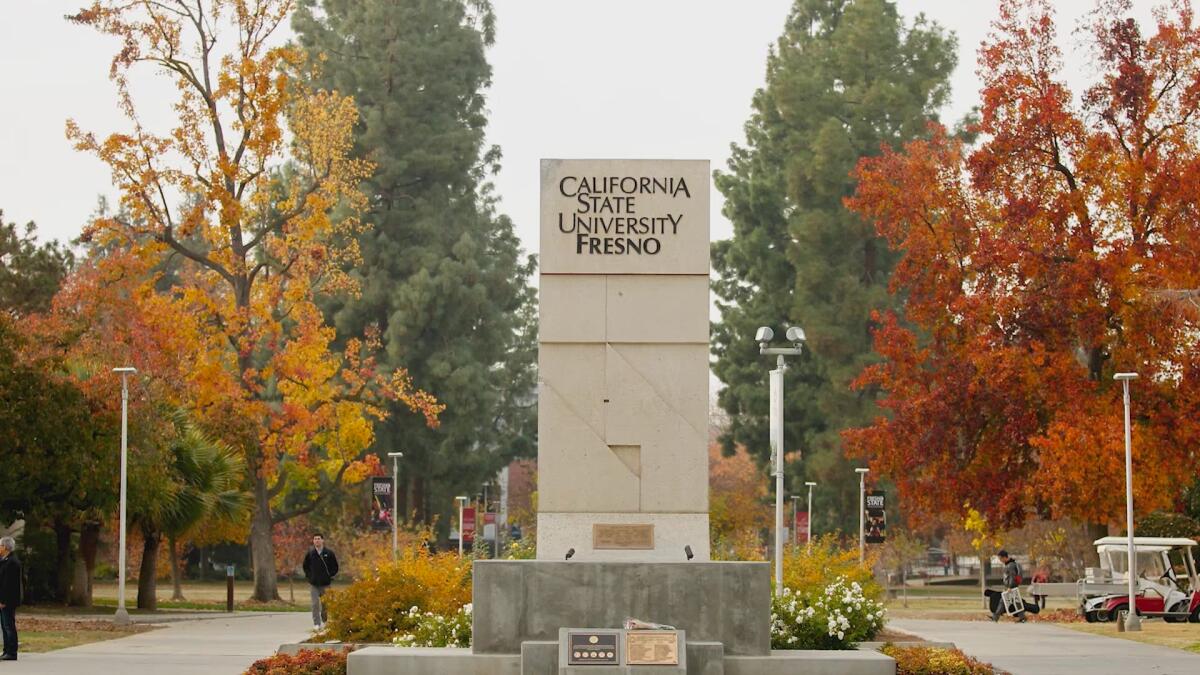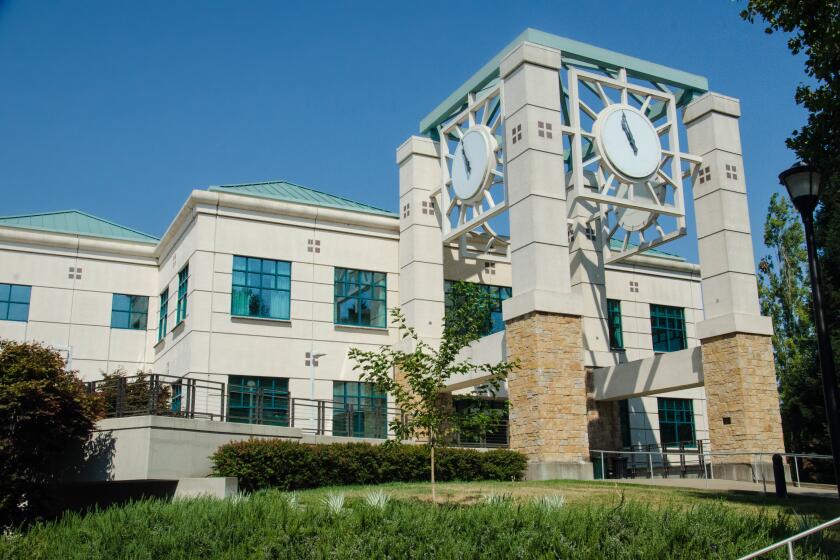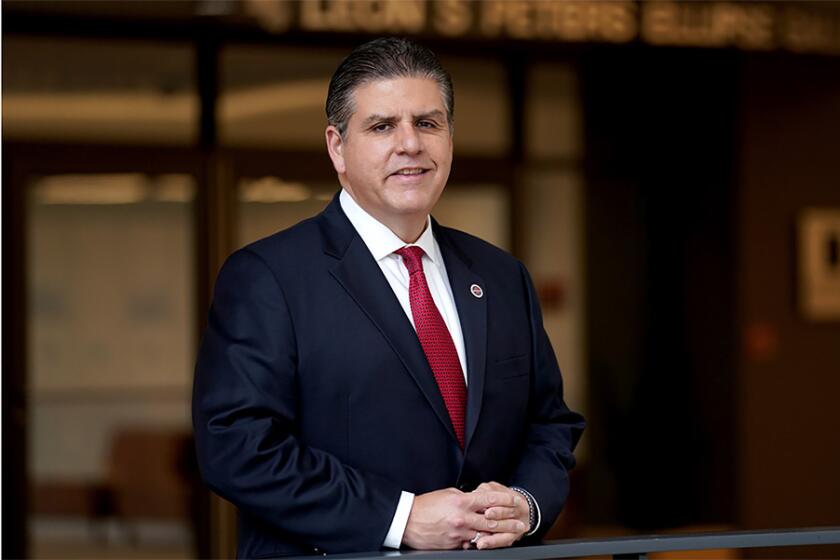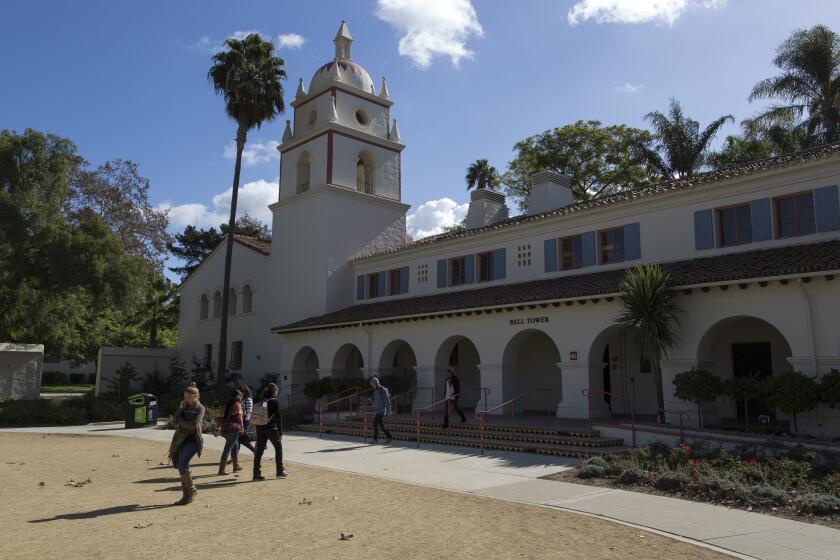Ex-CSU chancellor failed to handle allegations against friend at Fresno State, probe finds

- Share via
A long-anticipated investigative report by California State University into sexual misconduct and workplace bullying accusations against a former top administrator at Fresno State faulted the former campus president who later became CSU chancellor with failing to aggressively address the matter, which allowed the alleged misconduct to continue.
Former CSU Chancellor and Fresno State President Joseph I. Castro had a “blind spot” toward his friend Frank Lamas, who was hired as a campus vice president overseeing student life and later was accused in nine reports of sexual harassment, bullying and workplace retaliation from 2014 to 2019, according to the findings of the report released Thursday.
Castro’s “failure to more rigorously address reports of Lamas’ alleged misconduct as they surfaced was a notable factor that negatively impacted the effectiveness of the Campus’ responses,” said the 10-page report by an outside law firm, which previously investigated Lamas after one of his former employees alleged in a formal 2019 complaint that he had touched her inappropriately.
Previous complaints against Lamas had been informal or anonymous allegations that he had stared at a student employee’s breasts, made comments about women’s appearances and took retaliatory action against the school’s Title IX coordinator.
Lamas left the university in 2020 with a $260,000 payout and a strong letter of recommendation from Castro as part a settlement that was negotiated with the assistance of a retired judge and authorized by the CSU chancellor at the time. Three weeks later, Castro was named chancellor of the system.
Recent revelations about how California State University handled sexual harassment and workplace retaliation complaints have rocked the nation’s largest four-year public university system.
In a statement Thursday afternoon, Castro disputed the report’s findings, saying he had made decisions on sexual harassment and equity issues based on the advice of the previous chancellor and CSU’s general counsel, among others. He noted that Lamas had a contract that would have allowed him to return to a lifetime faculty position on campus even after an investigation concluded there was evidence of wrongdoing.
“I have been a steadfast champion for gender equity throughout my career and will redouble my efforts in this important area going forward,” Castro said.
Lamas, who has denied the allegations against him, questioned the thoroughness of the recent report.
“Employing the same investigator as did the original investigation just reinforces the bias, one sidedness and unjust investigations conducted by the CSU,” he told The Times.
The revelations, first reported in February, have roiled the nation’s largest four-year public university system and led to Castro’s resignation that month as chancellor.
The independent review, ordered by CSU’s board of trustees in March and led by the law office of Mary Lee Wegner, comes amid an ongoing Times investigation into breakdowns and inconsistencies in the way the 23-campus system handles complaints of sexual misconduct and workplace bullying and retaliation.
Former Fresno State staff member Jessica Shulz, who was interviewed for the investigation, said the report was “disappointing.”
She acknowledged that Castro could have been more forceful with Lamas, but said investigators failed to examine the roles of other top administrators on campus who oversaw investigations into sexual harassment and other misconduct.
“They really dropped the ball,” said Shulz, who worked under Lamas in the campus Cross-Cultural and Gender Center. “It upholds this narrative that this is at Castro’s feet and he [alone] was responsible.”
The report’s findings appear to contradict information that CSU‘s general counsel provided to the 25-member board of trustees in an email the morning the Lamas settlement was disclosed by USA Today.
“The matter was handled properly and in compliance with our policies,” General Counsel Andrew Jones said in a Feb. 3 email to the trustees, informing them that the chancellor’s office was involved in the controversial settlement. “All of this was done in consultation with then-Chancellor [Timothy P. ] White, per the Board’s standing orders.”
Chancellor Joseph I. Castro’s resignation follows outcry over his handling of sexual misconduct and workplace harassment allegations while he was president of Fresno State.
Wegner’s report did not examine the role that the chancellor’s office in Long Beach played in helping guide Castro as he navigated the campus controversy.
Records reviewed by The Times show that top-level officials in the chancellor’s office were informed about Lamas when he was placed on leave in November 2019 after the accusation by his employee. White and the general counsel’s office provided guidance as officials hammered out the details of the settlement with Lamas in 2020, the records show.
Kathryn Forbes, a Fresno State faculty member who is part of a campus task force examining sexual harassment, criticized Wegner’s report for failing to address the role of White and the CSU general counsel’s office in the Lamas controversy.
“The findings are favorable for Fresno State and the CSU but are not accurate regarding what actually happened,” said Forbes, who spent several years as a union steward representing faculty in sexual harassment and workplace misconduct investigations.
The report said Castro did not document actions he took to counsel Lamas following the early informal and anonymous misconduct allegations; nor did he issue written warnings, include concerns in Lamas’ performance review or put Lamas on an improvement plan.
But the report failed to acknowledge that CSU does not dictate what steps should be taken when complaints are raised informally, and that without a guiding policy, campus officials are typically left to decide for themselves. The lack of formal guidelines has led to discrepancies throughout the system in how such complaints are addressed, according to The Times’ ongoing investigation.
Allegations against Lamas first surfaced in 2014 but were not investigated until 2019, following a formal Title IX complaint that alleged Lamas had touched a female employee’s knee and moved his hand up her thigh in a car while talking to her about job prospects, after at least two years of other unwelcome contact with her. Title IX is the federal law that prohibits discrimination on the basis of sex at any federally funded educational institution.
That investigation, also overseen by Wegner, found “credible” evidence of wrongdoing.
The settlement with Lamas was authorized by outgoing Chancellor Timothy P. White on behalf of the board of trustees. But trustees have said they were unaware of the allegations and the terms of the settlement. Castro previously told The Times he believed White would have shared the information if he had deemed it necessary.
A review of hundreds of records reveal inconsistencies in addressing sexual harassment allegations at California State University.
Amid outcry over the revelations, the board directed the review of Fresno State in addition to an assessment of Title IX procedures at all 23 campuses.
“It is important that we understand how campus leaders at Fresno State responded to the workplace concerns about Dr. Frank Lamas,” then-board of trustees Chair Lillian Kimbell said in a March statement. “We will investigate the past to reveal potential new facts, learn and take appropriate action.”
Kimbell had previously said that Castro “acted in accordance with CSU policy in this case and used the management tools available to him to address the situation.”
More to Read
Sign up for Essential California
The most important California stories and recommendations in your inbox every morning.
You may occasionally receive promotional content from the Los Angeles Times.


















